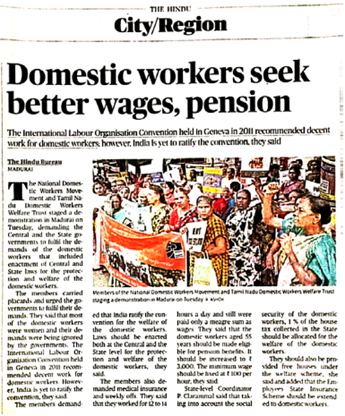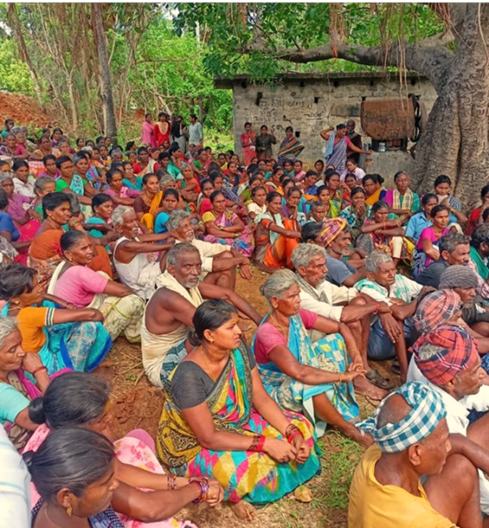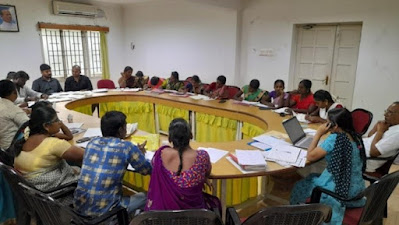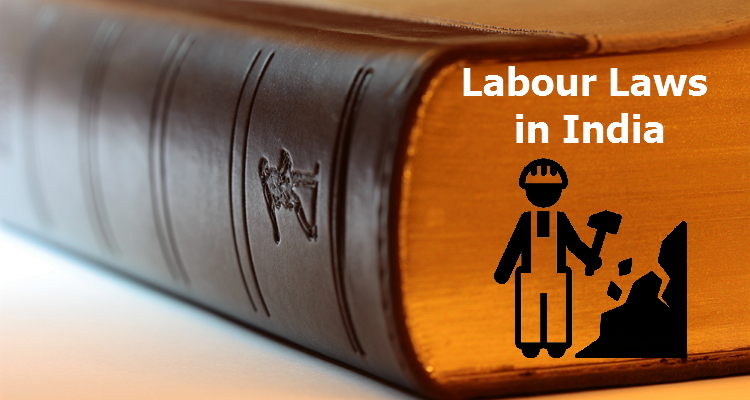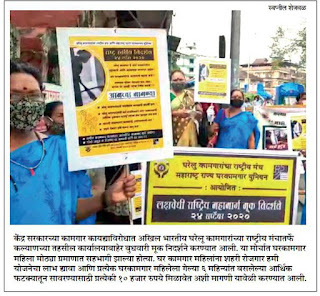The Working People's Charter, which involves some of the WSM partners in India, has drafted this statement related to the standard operating procedures to register unorganized or migrant workers in a database for the e-shram portal and social protection schemes.
Context
In the Suo Moto Writ Petition (Civil) No.6 of 2020 with Writ Petition (C) No. 916 of 2020 the Supreme Court gave the following direction on 29th June 2021 with respect to registration of unorganized workers:
“Central Government to develop the Portal in consultation with National Informatics Centre (NIC) for registration of the unorganized labourers/migrant workers. We also impress upon and direct that the Central Government as well as the respective States and the Union Territories to complete the process of Portal for registration under National Data Base for Unorganised Workers (NDUW Project) as well as implement the same, which by all means may commence not later than 31.07.2021. We also impress upon and direct that the process of registration of the unorganized labourers/migrant workers is completed at the earliest, but not later than 31.12.2021. All the concerned States/Union Territories and the Licence Holders/Contractors and others to cooperate with the Central Government to complete the process of registration of migrant workers and unorganized labourers so that the benefits of the welfare schemes declared by the Central Government/State Governments/ Union Territories be available to migrant workers and unorganized labourers for whose benefits the welfare schemes are declared”
It has been more than two months since this direction was given to the Central and State Government. Information regarding the concerned Government’s action plan to comply with the direction as per the time frame mentioned is not available in the public domain. We are aware of sporadic measures like surveys being conducted for instance by the Government of Delhi, but are not informed of the larger framework of implementation within which State led initiatives are being undertaken.
At present, there is no centralized national database of unorganized workers in India, in spite of enabling legal mandates under the Unorganized Workers Social Security Act 2008. A collective of worker groups, civil society organizations and academics who have worked extensively towards issues of labour rights have taken the initiative to build a “Model SOP” for registration of workers, which if implemented can ensure that the Government complies with the orders of the Supreme Court. The model SOP can be used by civil society groups, in individual and collective advocacy efforts, to push the Government at the Centre and State level to honour the directions of the Supreme Court in letter and spirit. SAFAR and Working Peoples’ Charter intend to prepare such a SOP by consulting and taking inputs from a range of trade unions, worker groups, campaigns, networks, activists, academics and subject matter specialists such that the contents of the SOP reflect collective priorities through a democratic and participatory manner. The basic objectives of this SOP are to empower unorganized workers, the Central Government and the State Government in India through following:
- Creation of a portable national database of all unorganized workers in India which will facilitate their unhindered access to multiple social security benefits
- Provide a unique registration number for each unorganized worker in India, so that she/he can claim and access entitlements, services and benefits from any place in the country
- Link potential employers with the unorganized workers
Introduction
The Indian economy is broadly divided into organised and unorganized sectors and with growth of economy, the organized sector is stagnant (in fact formal employment is shrinking) and unorganized sector is expanding or informal employment is increasing. Out of the estimated workforce of 474 millions, 17 percent (about 82 million) is employed in organized sector and 83 percent (about 392 million) is employed in unorganized sector. In general unorganized is informal also but about 55 percent of the workers in organized sector are also employed informally. In total about 92 percent of the total workers are engaged in the informal employment and majority of them have low earning and without any social protection. Out of the total informally employed workforce - 56 percent are self employed, 11 percent are regular salary wage earners and 33 percent are casual workers seeking employment on daily basis. (It is from 68 NSSO round, but have to check recent one)
The unorganized sector makes a significant contribution to the national wealth, yet workers in this sector do not have access to sufficient and reliable social security. These workers adopt informal strategies which are very expensive and their continued dependence on such strategies only rendered them more vulnerable. A vast majority of them do not have a fixed employer. There is a poor employer-employee relationship. With the enactment of the Unorganized Workers Social Security Act 2008, The Government of India has created a right based legal framework for providing social security benefits to the unorganized workers. According to section 10(1) of the Unorganized Workers Social Security Act 2008, it mentions that every unorganized worker shall be eligible for registration subject to the fulfillment of the conditions.
Definition of Unorganised Workers
As per the Unorganised Worker Social Security Act 2008 a worker should be recognized as an unorganised worker if he/she fulfills any or all of the following definitions:
- Self-employed worker (full time/part time)
- Wage worker- who does not get covered under social security net as per Unorganised worker Social Security Act (full time/part time)
- In case a worker is covered either in EPFO, ESIC or any other four acts as mentioned in schedule II of the Act, he/she is not an unorganized worker.
- 18 years-age till the person receives pension
Minimum principles to govern the process of registration of workers:
Self-declared information shared by workers has to be treated as true, unless proven wrong. Onus of proving veracity of information is on the State, and not on the individual worker.
Recognizing that, despite best efforts, the modes of registration can be corrupted or blocked, multiple modes (online and offline) and routes (multiple spatial access points) must be provided by the State in order to make it progressively difficult to inhibit attempts made by workers to register in a free and fair manner. Additionally, the state must make efforts to reach the worker more than expect the worker to come to it through organizing registration camps, door-step registration services etc.
Workers who have been registered on existing government portals / lists should not be asked to re-register themselves. Their inclusion in the NDUW should be automatic. In such a case of an auto-enrollment, worker’s unique registration number should be communicated to the worker by SMS on the given phone number and the worker’s registration card should be sent by post to the address in the database. However, if a person who is registered on any of the portals or lists appear at the registration desk, s/he should not be denied registration. An acknowledgement receipt with the ID, list from which the name has been pulled, and status (active / inactive / pending for renewal etc.) should be given along with the physical copy of worker’s registration ID card.
Workers who have any state approved ID/private document proving authenticity of information being states, have the option of submitting the same at the time of registration. However, no document beyond self-declaration will be required from workers in order to register themselves on the NDUW. A worker wishing to register himself/herself shall not be required to give any proof or any other personal details except those that may be necessary for contacting him/her.
It shall be the responsibility of the State/Central Government to take pro-active steps to reach the worker and facilitate him/her through the process of registration and other incidental activities, instead of relying on the worker to contact the State/Central Government
Transparency of information to workers – The Government must put in place mechanisms through which the workers are made fully aware about all the information regarding the registration process like know what registering to this database means, what benefits it will give them, and who will have access to the information to name a few.
Principle of portability - all workers can register anywhere, get info anywhere, access a center anywhere – no “home state” for registration – Benefits and coverage that follow from the ID must be accessible anywhere in India and should be designed that way.
Inclusion of worker organisation including trade union and voluntary organisations engaging with unorganized sector should be rope in for registration and awareness drive.
Process of registration
As mandated under Section 9 of the Unorganized Workers Social Security Act, 2008 the State Government shall set up ‘Worker Facilitation Centres’ at the Gram Panchayat and Ward level to facilitate the filling, processing and forwarding of application forms for registration of unorganized workers
In addition to the Worker Facilitation Centres at the Gram Panchayat and/or Ward Level, the State Government should ensure access of workers to multiple modes of registration. Workers/Employers/Trade Union or any worker organisations working in the unorganized sector on behalf of workers should also be able to register through the following ways:
- Labour Offices
- Helpline (govt and non govt run both)
- Web Portal
- Ration Dealer/ Post Office / Government Schools / Anganwadis / PHCs / Railway Stations / Metro Stations / Bus Stations / Booth Level Workers
- CSC network
- Gram Panchayat and Municipal Corporation
Govt may charge nominal fee @Rs 20 or less for the process of registration
The process of registration will be ongoing through the year. There will be no cut-off date beyond which workers cannot register themselves
Registration of workers will be renewed automatically, unless workers report a change in parameters by themselves
All those who register themselves on the NDUW will be provided with a dated acknowledgement slip at the time of registration which will contain the following details:
- Name of applicant for registration
- Date on which application for registration being submitted
- Location where application for registration being submitted
- Unique ID of the Application
- Name, designation and contact details of the functionary who has received the application for registration
- Date by when the worker will receive the ID card
- Details of how the worker can file a grievance as per provisions of Section 7
- The dated acknowledgement slip should contain the following information at an appropriate location
- No documents will have to be submitted by the worker at the time of registration
- The time period should be prescribed - which should not be more than two weeks.
- The dated acknowledgement slip provided to the worker at the time of registration should be considered as the registration ID until the worker is provided with the latter.
Workers will be provided with an ID Card within 15 days of submitting an application for registration which will include a unique registration number of a worker. Until this is provided, as stated above, the dated acknowledgement slip provided to the worker at the time of registration shall be considered as the unique registration ID of the worker.
The Central and State Government will access the database of workers registered under existing portals, and add the same to the National Database for Unorganized Workers. Workers registered under existing schemes/programmes will not be required to re-register on the National Database once again. If there is additional information that ought to be collected from Workers registered under existing schemes/programmes, it will be the responsibility of the concerned Gram Panchayat / Municipal Corporation to update the same.
The State Government may consider deploying the Nehru Yuva Kendra Cadre, National Social Service Cadre, National Cadet Corps to assist with registration, given Labour Departments across the country are understaffed. Additionally, the State Governments should actively involve worker organizations, empanel unions, federations, and labour collectives working in the State for the registration process.
Functions/Fields for registration of unorganized workers
- Full Name of the worker (Mandatory)
- Date of Birth (Mandatory)
- Age (Mandatory)
- Permanent address (Mandatory)
- Current address (Mandatory)
- Mobile Number (Mandatory)
- Gender (Mandatory. Male/Female/Transgender/Other)
- List of main occupations (Mandatory) (Annexure 1)
- Marital status (Not Mandatory)
- Is HOF(Head of Family)
- Caste Category( SC/ST/OBC/General) (Non Mandatory)
- Aadhaar Number (Non-Mandatory)
- Email id (Non- Mandatory)
- Bank account number (Non-Mandatory)
- Bank IFSC Code (Non-Mandatory)
- Bank type (Non-Mandatory)
- Person with Disability (PwD) (Yes/No) (Non-Mandatory)
- Percentage of disability if disabled (Non-Mandatory)
- Disability type if disable (Seeing, Hearing, Speech, Movement, Mental Retardation, Mental Illness, Other disability, Multiple disability) (Non-Mandatory)
- BPL Category (Yes/No) (Non-Mandatory)
- Ration card number (Non-Mandatory)
Workers who have any state approved ID/private document proving authenticity of information being states, have the option of submitting the same at the time of registration. However, no document beyond self-declaration will be mandatorily required from workers in order to register themselves on the NDUW. A worker wishing to register himself/herself shall not be required to give any proof or any other personal details except those that may be necessary for contacting him/her.
Automatic inclusion list and exclusion list
Workers registered under different schemes and boards will be automatically included in the NDUW with a unique identifier indicating that their details have been ported directly from other databases. At the time of distribution of material benefits to workers registered on the NDUW, the unique identifier will ensure that workers registered under different schemes and boards do not receive double benefits.
- Time-bound redress of grievances faced by workers in the process of registration and other issues
- The Booth Level Officer (BLO) will be appointed as the Grievance Redress Officer in their respective jurisdictions.
- The name and contact details of the concerned BLO will be proactively disclosed at Worker Facilitation Centres and all physical locations at which registration of workers is taking places in a prominent fashion.
- Workers facing any grievance in the process of registration will be able to file a complaint with the Booth Level Officer in writing, or through calls, SMS and web portals dedicated for the purpose of receiving and directing grievances to the appropriate BLO
All grievances received by the BLO in writing or through calls, SMS and web portals will be acknowledged with a dated acknowledgement slip which will contain the following details:
- Name of complainant
- Date on which complaint filed
- Description of complaint
- Location of complaint
- Time frame within which the complaint should be redressed
- Name, designation and contact details of the BLO who has received the complaint
All grievances filed by workers will be responded to and redressed within 15 days of the grievance being filed.
Transparency
All information collected and generated in the process of registration of workers under the NDUW will be publicly disclosed as per Section 4, RTI Act through a real time, transaction-based Worker Information System (WIS) set up for the purpose.
Applicants will be able to track the status of their application for registration, look up their registration number, download a registration certificate as many times, request an SMS with the registration information etc. through the WIS. In addition to these, wall painting should also be carried out in Panchayats and Ward offices in Municipalities by putting out the name of people who are registered.
All registered workers will be provided with a physical Registration ID Card, that will be provided at their current physical address. Workers should also have an option to download the Registration ID Card from the WIS anytime, anywhere by providing their registered phone number and unique registration number. The Registration ID Card provided to the worker physically, and the Card downloaded through the WIS will be treated equal in terms of sanctity. The Registration ID Card will contain the following details:
- Name of worker
- Unique Registration ID Number
- Date of registration
- Details of benefits provided to the worker
Employment categories of Unorganized Workers
1. Agarbatti making
2. Agriculture
3. Agriculture machinery handling
4. Animal Husbandry
5. Arrack and liquor production and vending
6. Automobile work
7. Bakery work
8. Band playing
9. Bangle manufacturing
10.Beads making / piercing
11. Beautician
12. Beedi manufacture
13. Bicycle repair
14. Bindi work
15. Blacksmithy
16. Boat/Ferry occupation
17. Book binding
18. Brick kiln work
19. Brush making
20. Breweries Distilleries
21. Building and road maintenance
22. Bulb Manufacturing
23. Bullock/Camel-cart operation
24. Butchery
25. Cable TV operation
26. Cane/Reed work
27. Carpentry
28. Carpet weaving
29. Cashew processing
30. Catering
31. Chikan work
32. Cine service
33. Cloth printing
34. Clubs and canteen services
35. Coaching services
36. Coir processing/manufacture
37. Confectionery
38. Construction work
39. Construction of tents and pedals supply of utensils and decoration for function
40. Courier service
41. Dairying and allied activities
42. Data entry operations
43. Distribution of petroleum products
44. Domestic work
45. Dyeing
46. Electronic, electrical goods repairs
47. Electroplating
48. Embroidery work
49. Envelope making
50. Firework cracker production
51. Fishery production
52. Fish processing
53. Flora work and garland making
54. Flour mills operations
55. Footwear production
56. Forestry operation
57. Foundry
58. Gardening and parks maintenance
59. Garment manufacture
60. Gems cutting
61. Ginning
62. GIG/Platform Economy
62. Glassware manufacturing
63. Goldsmithy
64. Hairdressing
65. Handloom weaving
66. Hawking and vending
67. Headload work
68. Health service
69. Honey gathering
70. Horticulture and floriculture
71. Hotel and restaurant service
72. Lock making
73. Manual operation of unspecified jobs
74. Masala making
75. Matches manufacture
76. Minor forest produce gathering
77. Minor mineral and mines work
78. Newspaper vending
79. NGO services
80. Oil extraction
81. Packing and packaging
82. Panwalla services
83. Pappad making
84. Petrol bunk/pump and allied services
85. Pickle making
86. Plantation
87. Plastic manufacture
88. Pottery
89. Powerloom weaving
90. Printing press work
91. Quary work
92. Rag picking
93. Rice Milling
94. Rickshaw pulling
95. Salt pan work
96. Sand mining
97. Sawmill work
98. Scavenging
99. Security services
100. Sericulture (Silk rearing)
101. Service station work
102. Shepherding
103. Shoe shining work
104. Shop and establishment work
105. Small-scale industries
106. Soap manufacture
107. Sports good manufacturer
108. Steel vessels and utensils manufacture
109. Stone crushing
110. Tanning(including hides and skin production) leather goods manufacture
111. Telephone booth service
112. Sweeping
113. Temple leaves collection
114. Tendu leaves collection
115. Timber industry(Furniture manufacture)
116. Tobacco processing
117. Toddy tapping
118. Toy making
119. Transport service(driving, conducting, cleaning) etc.
120. Laundry work
121. Wayside mechanics and workshop service
122. Welding
123. Any other occupation that is not listed above, but the worker declares as his/her occupation. This occupation will be periodically added to the above list.
These employment categories in the unorganized workers are a suggestive list and should not be limited to just these. Additionally, if any new category emerges through workers’ response during the time of registration under 123, it should become a new category on the WIS too. Workers must be allowed to choose any number of categories of works at the time of registration and should not be restricted to choose a fixed number.

